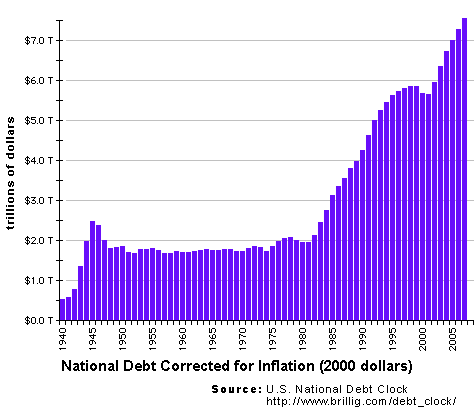Wikipedia's definition:
"A Ponzi scheme is a fraudulent investment operation that pays returns to separate investors, not from any actual profit earned by the organization, but from their own money or money paid by subsequent investors. The Ponzi scheme usually entices new investors by offering returns other investments cannot guarantee, in the form of short-term returns that are either abnormally high or unusually consistent. The perpetuation of the returns that a Ponzi scheme advertises and pays requires an ever-increasing flow of money from investors to keep the scheme going."Many people may think that their Social Security deposits are put into a personal account that accumulates interest and then pays out at retirement. This is incorrect. Current expenses are paid by current revenues. This meets the first part of the definition of a Ponzi scheme as the "investment" outflows are financed by current inflows. Normally, there was plenty of revenue to cover the payouts as we had about 20 payees for every retiree. The excess cash was invested in special government bonds (indirectly financing our government's deficit spending). However, now we have about 3 payees for every beneficiary and are spending more than we take in. This meets the final part of the definition; that is, requiring an increasing flow of money from investors to keep going. Social Security (and Medicare) are an enormous liability going forward for the US and if not taken care of, our debt will grow exponentially (if we haven't defaulted by then).
There are no easy solutions to the problem and in our world of reelection over the long-term well-being of the country, it is almost impossible to deal with. Do we just end it now and tell older workers "We're sorry?" That would alienate the older voters who have had to finance other people's retirements but won't get their own SS checks; a sure way to not get reelected. Do we simply ignore the problem and take on more debt to finance it? This would surely lead to a rise in our borrowing costs and another downgrade. With so much focus on debt right now, I don't think someone could be elected who doesn't convince voters he's going to do at least something to curb the SS deficit. I think the path of least resistance to the problem is to convince voters that you're going to make sure older people are fully paid out and that somehow you will gradually and painlessly bring the costs under control. Of course, this is impossible, but we live in America where we get an A++ in kicking the can down the road and an A++ in ignoring math and believing in rhetoric. If you really believe we can and will lower the deficit caused by excess spending, please view this chart:
This chart only goes up to 2007. Guess where we're at now. $14.7 trillion or double where we were just 4 years ago. It is clear that we never have and never will rein in spending. This is mainly because we have the backstop of the printing press and the Fed to give us more dollars in case we run out and also because no one will get elected by taking away benefits from people. The end game is interest rates soaring when other countries refuse to lend to a country that engages in massive currency devaluation and hyperinflation and the question is when, not if. Being the ultimate can kickers, who knows when this will happen, but it is inevitable.
For more on Social Security being a Ponzi scheme, see Social Security, a Ponzi? - I Think so

No comments:
Post a Comment